Amour, Michael Haneke: On a Beautiful Murder
In Amour (2012), Michael Haneke presents Georges and Anne Laurent, an elderly French middle-class couple played by Jean-Louis Trintignant and Emmanuelle Riva. Their presence on screen recalls decades of French cinema and awakens memories for the audience. Riva herself, unforgettable in Alain Resnais’s Hiroshima Mon Amour, is already a lasting figure in film history. Haneke deliberately revives that image, half a century later, placing her in Amour within a story layered with philosophy.
The couple, once music teachers, are now retired, facing old age and the slow decline of body and mind. Their daughter, played by Isabelle Huppert who was also the lead in Haneke’s The Piano Teacher, is a classical musician. Preoccupied with her own life, she still visits her parents often. This casting choice underlines the contrast between their worlds, echoing themes Haneke explored before.
In Amour, Haneke portrays the routines of daily life. Yet beneath the simple gestures, the silence, and the sluggish pace, he reveals something darker. What at first appears to be a quiet, ordinary existence, a pair of retirees attending concerts, reading books, and sustaining a tender long-lasting love, suddenly fractures. With the intrusion of illness and aging, the façade collapses, exposing other faces of life: frailty, decay, and death.
Life and Its Eternal Paradoxes
Amour unfolds with a slow and stifling rhythm that captures the inertia of life. Yet it is charged with the unsettling tensions that signal death. Haneke suggests, through this clash of paradoxes, that love holds beauty that ends in death, and ugliness that reveals itself in life.
Written and directed by Austrian filmmaker Michael Haneke, Amour focuses on a short span in the couple’s later years. Anne suddenly falls ill, her mobility impaired, and their world shrinks to the confines of their home. The film’s craftsmanship and its blend of philosophical, psychoanalytic, and sociological depth won wide acclaim, earning the Palme d’Or at Cannes in 2012. It also received four Oscar nominations and won the Academy Award for Best Foreign Language Film.
Following The White Ribbon (2009), which won Haneke his first Palme d’Or and dissected social traditions with sharp critique, Amour continued his exploration of moral and existential questions. Years later, in 2017, he returned to these themes in Happy End, still unable to part ways with the shadow of Amour.
At the heart of the film lies a devastating shift: Anne becomes partially paralyzed. Outwardly, Georges responds with loyalty, caring for her with quiet persistence. But the backdrop is bleak. Retirement has stripped away the energy of university life, the bustle of concerts, the dynamism of students, and even the restless striving of their daughter’s life. What remains is a routine steeped not only in old age but in a deeper meaninglessness. For Georges, life after its long arc of passion now feels unbearably dull, its ethical values hollow. He continues to love music, as Anne once did, but cannot find an answer to his tormenting questions. Why must he keep caring? Why has life become so stifling? Why is there no climax, no end that feels worthy? Why must one simply surrender to a slow, undignified decline?
In a moment of philosophical madness, he kills Anne. And the viewer is left suspended, uncertain: was it an act of love or a gesture of detachment toward the woman who shared his life for decades? His long struggle, frail and aged, barely able to move, trying to create comfort for her and meet her needs, is moving. Yet at the same time we glimpse violence, a distance that was perhaps always present between them. Georges has promised never to send her to a hospital. But then comes the ethical dilemma: is it more faithful to keep that promise, or to preserve her life?
Is ending the life of someone nearing the end, whose presence feels like a burden to herself and others, an act of love? Does it honor her dignity, her desire not to lose herself? Or is it fatigue, a refusal to endure the long years of caretaking? Was it a beautiful murder, with Anne dressed and surrounded by flowers as though death itself were a final gesture of tenderness? Or was it simply an escape from moral duty that Georges could not bear to uphold?
Amour is a painful film. It confronts life, death, hope, finality, and the meaning of existence with stark clarity. Yet in it, love is not what we usually imagine. Haneke seems to suggest that love is inseparable from the monotony of life itself. In love there is both life and death.








بدون دیدگاه